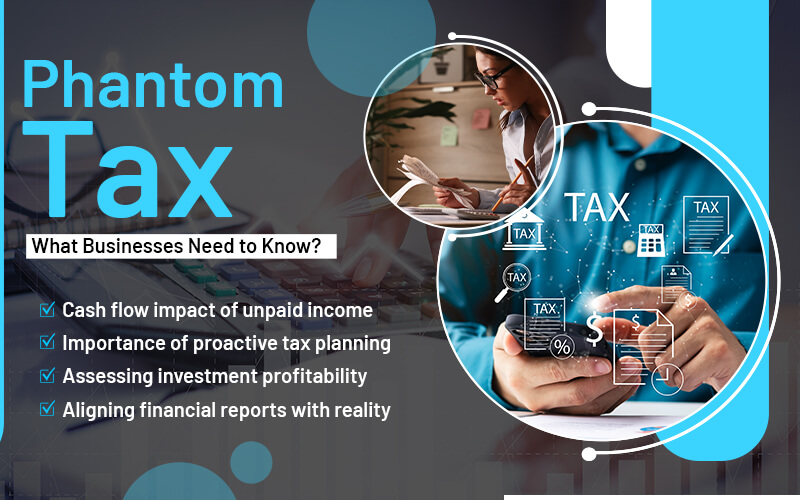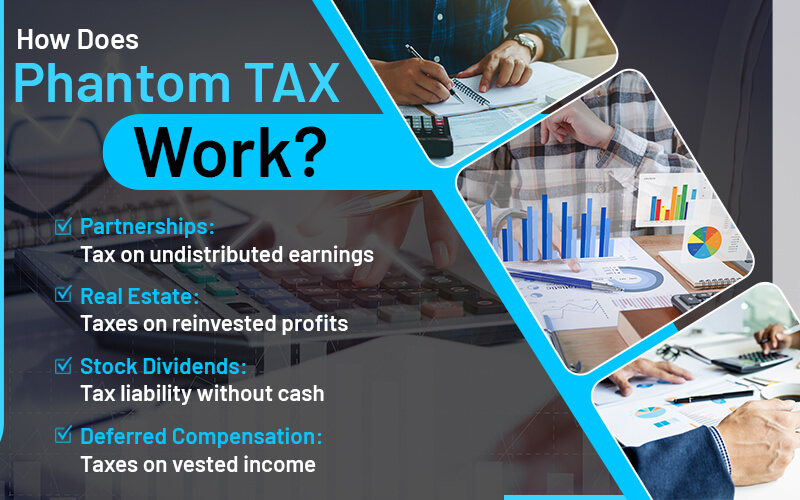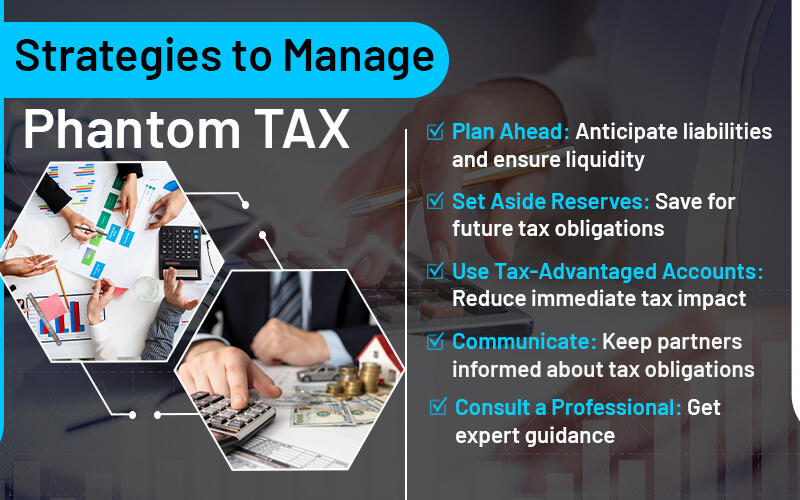Phantom tax often occurs in partnerships, investments, and real estate transactions. It refers to a taxable gross income the taxpayer has not received as cash. It typically occurs when taxable income is generated but not distributed to the taxpayer.
For example, in a real estate investment trust (REIT), an entity generates income and reinvests in the business instead of distributing it to the investors. The investors are liable to pay taxes on their share of the earnings even though they haven’t received any cash. It creates a financial burden, as they need to find another means to pay tax on this “phantom” income.
Are you one of the unfortunate phantom taxpayers? There is plenty for you to know. This blog discusses how this tax works, when to expect it, and what to do to cope with it.
Phantom Tax and Businesses
Phantom tax can be crucial for businesses, affecting budgeting, strategic development, and enterprise regulation. Here are a few things to understand:

Phantom tax benefits businesses because it can impact cash flow management and tax planning strategies. Here’s why:
-
It Impacts Cash Flow
Phantom tax can strain a business’s cash flow since it requires paying taxes on income not received in cash. The business must have sufficient liquidity to cover these liabilities, although no corresponding cash inflow occurred.
-
It Affects Tax Planning
Businesses can anticipate their tax obligations better by understanding phantom tax, which can help them avoid unexpected tax burdens. When planned properly, and the business has abundant resources to meet the liabilities, it can mitigate the effect of phantom income.
-
It Helps Make Investment Decisions
Businesses involved in real estate investments, partnerships, or other ventures with room for phantom income can be aware of potential phantom tax implications when evaluating the tax efficiency and profitability of those investments.
-
It Helps in Financial Reporting
Phantom tax also affects how businesses report financial performance. It may create a discrepancy between reported income and actual cash flow, making it essential to communicate the distinctions to stakeholders.
Overall, understanding phantom tax is essential for effective financial management and ensuring that a business is prepared for any tax obligations that arise from non-cash income.
How Does Phantom Tax Work?
Phantom tax typically arises when an entity earns income but does not distribute it to its investors or partners. Here’s how it works in different contexts:

-
Partnerships and LLCs
In partnerships or LLCs, income is passed to the members or partners, who must report it on their tax returns. Even if the business retains the income for reinvestment or other purposes, the partners or members are still taxed on their share of the earnings. This situation can lead to a phantom tax scenario where individuals owe taxes on income they haven’t received as cash.
-
Real Estate Investments
In real estate ventures, such as a real estate investment trust (REIT) or a real estate partnership, the entity might generate rental income, capital gains, or other types of earnings. If the entity decides to reinvest these profits into acquiring more properties or improving existing ones instead of distributing them to investors, those investors may face phantom tax. They must pay taxes on their share of the earnings even though they haven’t received any cash distributions.
-
Stock Dividends
Another example of phantom tax can occur with stock dividends. If a company issues dividends in the form of additional shares rather than cash, shareholders may still be liable for taxes on the value of the dividend, even though they haven’t received any cash.
-
Deferred Compensation
Sometimes, employees may defer a portion of their compensation to receive it in the future. However, if the deferred compensation is vested or certain conditions are met, the employee might be taxed on it before receiving the cash. This can create a phantom tax liability.
Also Learn: What is Tax Liability?
When Should You Expect Phantom Tax?
Phantom tax can arise in various situations, particularly in the following scenarios:
Reinvested Earnings: As in the REIT example, when a business or investment vehicle generates income but reinvests it instead of distributing it to investors or partners.
Pass-Through Entities: In partnerships, LLCs, S-corporations, and other pass-through entities where income is reported on individual tax returns, even if not received.
Non-Cash Dividends: When a company issues dividends in forms other than cash, such as stock dividends or property.
Deferred Compensation: If compensation is deferred and becomes taxable before being received by the employee.
How to Cope with Phantom Tax?
Dealing with phantom tax can be challenging, but there are strategies to help mitigate its impact:

Plan Ahead:
Anticipate potential phantom tax liabilities by staying informed about the income your investments or business may generate and how it will be distributed. Proper tax planning is crucial to ensure you have the liquidity to cover any tax obligations.
Set Aside Reserves:
Consider setting aside a portion of your cash flow or income to cover future tax liabilities. This is especially important if you are involved in investments or business activities where phantom tax might arise.
Tax-Advantaged Accounts:
If possible, structure your investments in tax-advantaged accounts, such as IRAs or 401(k)s, where the income can grow tax-deferred, potentially reducing the immediate impact of phantom tax.
Communicate with Partners and Investors:
If you are a business owner or part of an investment partnership, maintain open communication with your partners or investors. Ensure they understand the potential for phantom income and the related tax obligations, so everyone is prepared.
Consult a Tax Professional:
Given the complexities of phantom tax, working with a tax professional is advisable. They can help you navigate the tax implications, explore potential deductions, and develop a strategy to minimize your tax burden.
Conclusion
Phantom tax is a challenging aspect of tax law that can catch businesses and investors off guard. It’s the tax on income you haven’t received, which can strain cash flow and complicate financial planning. By understanding how phantom tax works, recognizing when it might arise, and implementing strategies to manage it, you can mitigate its impact on your finances.




